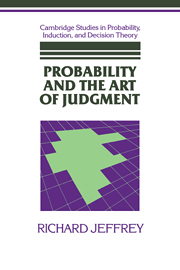Book contents
- Frontmatter
- Contents
- Preface
- 1 Introduction: Radical probabilism (1991)
- 2 Valuation and acceptance of scientific hypotheses (1956)
- 3 Probable knowledge (1968)
- 4 Probability and the art of judgment (1985)
- 5 Bayesianism with a human face (1983)
- 6 Alias Smith and Jones: The testimony of the senses (1987)
- 7 Conditioning, kinematics, and exchangeability (1988)
- 8 Preference among preferences (1974)
- 9 On interpersonal utility theory (1971)
- 10 Remarks on interpersonal utility theory (1974)
- 11 Mises redux (1977)
- 12 Statistical explanation vs. statistical inference (1969)
- 13 New foundations for Bayesian decision theory (1965)
- 14 Frameworks for preference (1974)
- 15 Axiomatizing the logic of decision (1978)
- 16 A note on the kinematics of preference (1977)
- Frontmatter
- Contents
- Preface
- 1 Introduction: Radical probabilism (1991)
- 2 Valuation and acceptance of scientific hypotheses (1956)
- 3 Probable knowledge (1968)
- 4 Probability and the art of judgment (1985)
- 5 Bayesianism with a human face (1983)
- 6 Alias Smith and Jones: The testimony of the senses (1987)
- 7 Conditioning, kinematics, and exchangeability (1988)
- 8 Preference among preferences (1974)
- 9 On interpersonal utility theory (1971)
- 10 Remarks on interpersonal utility theory (1974)
- 11 Mises redux (1977)
- 12 Statistical explanation vs. statistical inference (1969)
- 13 New foundations for Bayesian decision theory (1965)
- 14 Frameworks for preference (1974)
- 15 Axiomatizing the logic of decision (1978)
- 16 A note on the kinematics of preference (1977)
Summary
These essays explore a variety of topics, ranging from decision theory and the philosophy of mind to epistemology and scientific methodology, from a probabilistic viewpoint of a sort called subjective (Bruno de Finetti's term), personal (L. J. Savage's), and judgmental (mine). While the focus varies from historical and philosophical overviews to close technical studies, the point of view remains pretty steady (or, anyway, evolves pretty slowly). Its individuating features are a radical probabilism that accepts probability judgments as basic where the usual Bayesian position would root them in certainties, and a view of making up your mind as covering dynamics: how to change your mind. Thus, empirical data may well be coded not as probabilities or as odds but as factors to multiply probabilities or odds by in order to update them in the light of experience. The formal logic of that process identifies invariance of conditional probabilities as validating a certain generalization of the usual “Bayesian” updating scheme, but the judgment of invariance in particular cases is no formal matter. Probability logic is seen not as a source of judgment but as a framework for exploring the implications of probabilistic judgments and testing their mutual compatibility.
Essay 1 is new; the rest, going back over 35 years, appear here essentially unchanged, with afterthoughts clearly labeled, and mostly segregated in postscripts. Here is a brief guide.
1. “Radical probabilism” (1991) depicts the position elaborated here as a development out of logical empiricism, radicalizing Carnap's (and Reichenbach's) probabilism, probabilizing Quine's deductivism.
- Type
- Chapter
- Information
- Probability and the Art of Judgment , pp. ix - xiiPublisher: Cambridge University PressPrint publication year: 1992

